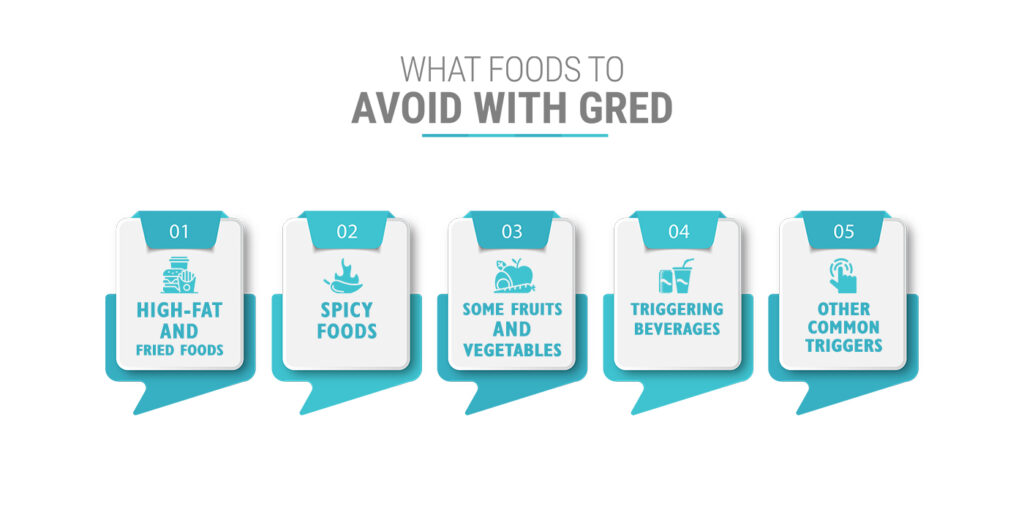If you have ever felt that burning sensation rising from your stomach to your chest after taking a meal, you are not alone. Many people struggle with acid reflux— a condition that can turn even the most enjoyable foods into a source of discomfort. The burning sensation in your chest, the bitter taste in your mouth, it is not just unpleasant, it can seriously affect the quality of your life.
One of the most effective ways to manage acid reflux is by making smart choices about what you eat. In this blog we are going to understand what acid reflux or GERD is, and what foods you should avoid if you have GERD.
What is GERD?
GERD (Gastroesophageal reflux disease) is one of the most common gastrointestinal disorders that affects about 20% of adults in western culture. It is a chronic acid reflux condition that is diagnosed by a doctor.
Acid reflux happens when acid from your stomach flows back into your esophagus (food pipe), the tube that connects your mouth and stomach.
Under normal conditions, the lower esophageal sphincter (LES)—a ring of muscle that acts like a valve—opens to let food come into the stomach and then tightens to prevent it from coming back up. But when this muscle relaxes or weakens, it can allow the acidic stomach contents to flow back in the esophagus, leading to heartburn.
Common symptoms of GERD include:
- Heartburn
- Regurgitation
- Chest pain
- Difficulty swallowing (dysphagia)
- Chronic cough
- Sore throat and hoarseness
- Hiccups
- Burping
- Nausea or vomiting
- Bad breath
Foods to Avoid with GERD and Acid Reflux:
What you eat plays a big role in how often and severe the symptoms of GERD or acid reflux show up. In fact, diet is often the first approach that doctors recommend to manage GERD.
Here are some foods that should be avoided if you have GERD:

1. High-Fat and Fried Foods:
Meals that are high in fat can make acid reflux worse by lowering the pressure in lower esophageal sphincter (LES), the muscle that keeps stomach acid from rising into your esophagus. They can also slow down your stomach emptying and increase the risk of reflux.
To help prevent acid reflux, try cutting back on overall fat intake.
Some high-fat foods to avoid include:
- French fries
- Potato chips
- Fried chicken
- Fast food burgers
- Butter
- Deep fried onion rings
- Whole milk and full-fat dairy
- Cheese
- Pizza
- Ice cream
- Sour cream (full-fat)
- Creamy salad dressings and dips
- Rich, creamy sauces
- Fatty cuts of red meat like prime rib
- Fatty meat like bacon and sausages
2. Spicy Foods:
If you are prone to acid reflux, spicy foods might be adding fuel to the fire. Capsaicin— the compound that gives chilli powder its heat—can irritate the lining of your esophagus and trigger symptoms of acid reflux.
A 2017 Krorean study found that more than half of the participants experienced GERD symptoms after eating spicy stews, which is a popular dish in Korean cuisine. This aligns with the experiences of many people who report flare-ups after taking hot or heavily seasoned meals.
In short, spicy foods appear to be a significant trigger of symptoms in people with GERD. So if you feel discomfort after eating dishes with hot peppers, chilli powder, or spicy seasoning, it’s best to avoid them.
3. Some Fruits and Vegetables:
Fruits and vegetables are important for a balanced diet, but some types of fruits and vegetables can worsen the symptoms of GERD due to their acidity or chemical composition.
Common culprits include:
- Pineapple
- Citrus fruits such as oranges, grapefruit, and lemon
- Tomato and tomato based products
- Garlic
- Onions
Everyone has a different tolerance level, so it is a good idea to work with a doctor or a registered dietician to make a meal plan that suits your digestion.
4. Triggering Beverages:
Some drinks can also trigger acid reflux, especially if they are acidic, caffeinated, and carbonated.
The triggering beverages to watch out for include:
- Alcohol
- Coffee
- Tea
- Citrus drinks
- Tomato juices
- Sodas and fizzy drinks
Even decaffeinated coffee can cause acid reflux in some people, so it’s best to pay attention to how your body reacts. Stick with the beverages that don’t trigger your symptoms.
5. Other Common Triggers:
A number of other items— both in your pantry and your medicine cabinet— can relax the lower esophageal sphincter (LES) and trigger symptoms of GERD..
Here are some of those items:
Foods and Additives:
- Chocolate
- Mint such as peppermint
- Heavily processed or packaged foods
Medicines:
- Pain relievers (Aspirin, NSAIDs)
- Certain antibiotics
- Alpha blockers
- Calcium channel blockers
- Tricyclic antidepressants (TCAs)
- Theophylline
- Nitrates
- Iron supplements
- Potassium supplements
If you think that a medicine is making your symptoms of GERD worse, don’t stop using it on your own. Always talk to your doctor first, they may adjust your dose or suggest an alternative.
Conclusion:
Living with GERD or acid reflux doesn’t mean you have to give up enjoying foods. It’s about making informed choices about what you eat. By understanding what foods trigger your symptoms of GERD or acid reflux, you can take control of your digestive health and reduce discomfort. Avoiding high-fat meals, spicy dishes, acidic fruits and vegetables, carbonated drinks, and certain medications, and adding foods that help prevent acid reflux in your diet , can go a long way in managing acid reflux.
Pay attention to your body and work with your doctor or dietician to make a meal plan that supports your well-being.
With the right approach, you can enjoy mealtimes again— without the burn.








